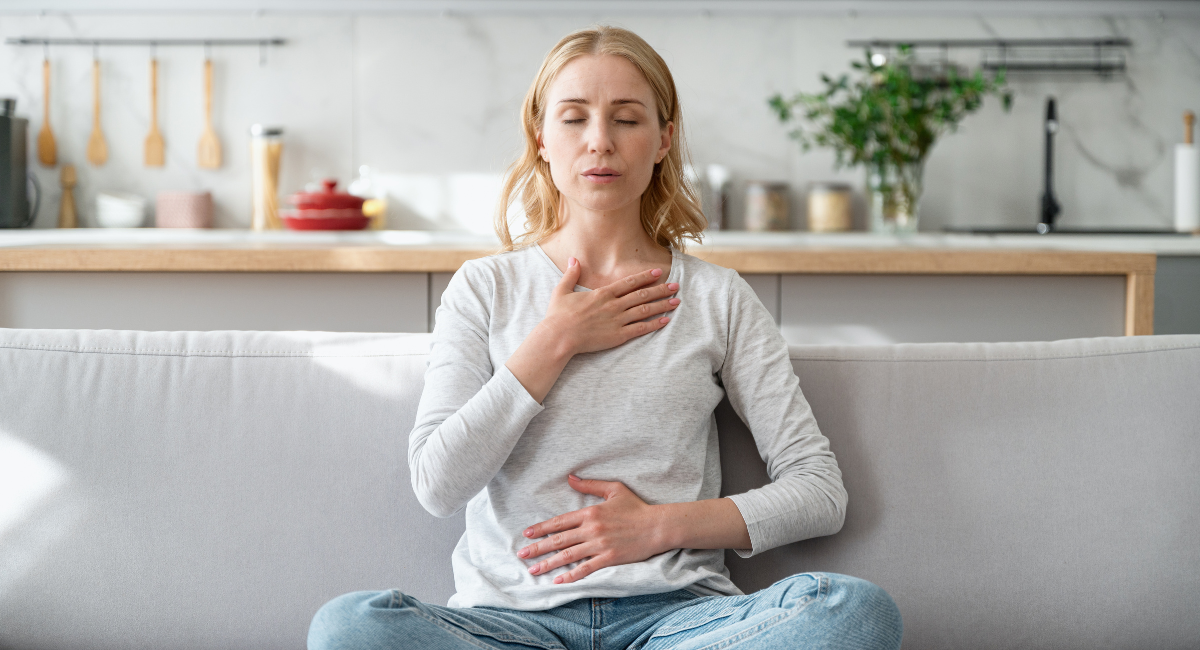
In today’s fast-paced world, understanding the benefits of meditation and mindfulness has never been more important. Research consistently shows the benefits of deep breathing and regular relaxation techniques for managing daily stress. Whether you’re managing a demanding inbox, dealing with workplace challenges, or juggling family responsibilities, the need for effective stress management has never been more crucial. Yet many people struggle to find practical ways to incorporate these beneficial practices into their busy lives.
Tryon Medical Partners family medicine specialist Megan Okuda, PA-C, shares three essential approaches to managing stress and finding moments of calm in your daily routine.
1. Understand the mind-body connection.
PA-C Okuda says the connection between mental and physical health is often overlooked in our “go-go-go” culture but the benefits of meditation extend to both mental and physical well-being.
From a cognitive standpoint, it’s very easy for us to get worked up and thoughts to spiral. Stress also triggers physiological reactions – your heart rate increases and blood pressure elevates. The benefits of deep breathing and meditation methods help both with cognitive engagement and keeping your body in better homeostasis.
“When we’re constantly moving, we’re disconnecting from our sense of self,” notes PA-C Okuda. “Taking 30 minutes for relaxation techniques without guilt is not just okay – it’s essential.”
2. Practice targeted breathing exercises for stress.
There are several specific breathing exercises for stress that can be incorporated into daily life:
- Basic deep breathing: Start with slow, deep breaths – inhale through the nose, exhale through the mouth, and hold for a count each time. Do this whenever you have a spare moment or notice yourself starting to feel mentally or physically overwhelmed.
- 5-4-3-2-1 technique: This exercise engages all your senses. Take a pause and identify five things you can see, being as detailed as possible. Then notice four things you can hear, three things you can feel, two things you can smell, and one thing you can taste. This pulls you into awareness of your environment and away from worry and anxiety.
- Body scan: For end-of-day unwinding, try a body scan. Close your eyes and start from head to toe, focusing on where you’re holding tension. Release your forehead, jaw, neck, and shoulders – spend extra time there. Go through every part and consciously relax all those muscles.
“Intentional, mindful breathing is great at every time of the day but the benefits of deep breathing are particularly noticeable before bedtime,” PA-C Okuda notes. “Especially if you tend to have trouble sleeping, try one of these techniques as you wind down for the evening.”
3. Explore guided resources and establish routine.
While self-guided relaxation techniques are valuable, PA-C Okuda encourages patients to explore additional resources. Especially if you’re just starting out, some guided meditation and breathing options may be helpful in making the habit stick.
“There are many accessible options for experiencing the benefits of meditation,” PA-C Okuda shares. “Consider using reputable apps or online videos for guided meditations. Taking an organized meditation or yoga class can also be beneficial – having someone guide you through breathing exercises for stress and regular scheduled sessions can help maintain consistency.”
PA-C Okuda emphasizes that mindfulness is universal, despite lingering misconceptions. “There’s still some stigma when it comes to mental health and gender norms, especially among men. But the benefits of meditation and mindfulness are applicable to every single person. We all experience stress and live in this wild and chaotic world. It’s about finding which relaxation techniques work for you and remembering that you’re only human – cut yourself some slack.”
You’re not alone – if you’re feeling overwhelmed, connect with your care team to learn more about mental health support and overall wellness services today.

